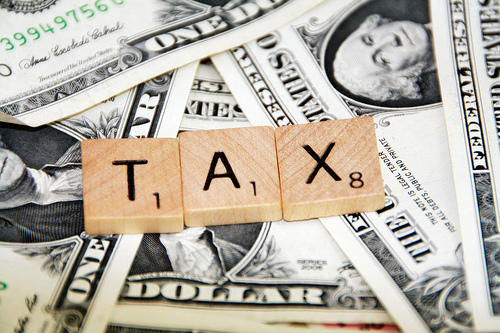Tax Liens-
Every homeowner, has to pay property taxes. If these taxes aren’t paid, the city or county imposes a tax lien against the property. Some states allow investors to purchase tax lien certificates at auction. As an investor buying these certificates, you buy the right to pay of this debt and in exchange collect interest on the debt until the property owner repays the lien in full (including very favorable interest payments, which is your profit), or forfeits the property. In the event he forfeits the property, then you can become the new owner.
 The Advantages of Tax Liens
The Advantages of Tax Liens
These liens can offer fixed-rate interest returns, and if not, then the rights to property at a fraction of its real value. If purchased correctly, the investor makes money whether he actually gets property ownership or not.
Buyer Beware
Although Tax liens can be very profitable they do require research before investing in them. Sometimes, an investor places money in a tax lien only to find it isn’t worth anything. For instance, if a homeowner is in a bankruptcy process, while the tax lien goes into effect, the court could decide that the rights of the investor are forfeited to IRS debt but generally the Tax Lien takes precedence. Additionally, a property could be so damaged that the structure is uninhabitable or unbuildable. This is why physical inspections are so crucial.
The Tax Lien Process
Not all states offer tax lien sales, and different states have different regulations regarding what happens in the event of a default and how the bidding process is handled, so the first step is to find the states that participate in the process. The easiest way to start your search is by looking at your home state so you can easily check out the property. You can also look for states that offer tax liens online. Alternatively, you can call the state comptroller’s office to find out if it offers tax liens.
Ask for a list of all tax lien properties. You’ll find many of these Liens listed at extremely low prices, and may even be tempted to purchase several of the liens you see. But hold on! You have to do your research first. You need to check to make sure there are no other liens on the property. You need to research the property to see what condition it is in.
Start by using Google Maps to find the physical address of the location. Look for an actual structure, lot size, etc. Check the records for other liens or assessments, and check to see whether these may remain on the property once you purchase it. Tax liens can take precedence over other liens so in the event of a foreclosure the bank may make you an offer to gain control of the property, but once again this can vary from state to state. Some states offer Tax Liens while others offer Tax Deeds. Be sure to understand all the implications for the particular state you are interested in.
The Difference between a Tax Lien and a Tax Deed
In a tax lien state you are paying someones taxes for them and you get a lien against their home. The majority of the time these will be repaid with interest either by the homeowner, by the bank prior to foreclosure, or during the resale process of the home. Tax Deeds on the other hand actually give you a deed to the property. At that point you may have to evict the current residents and there may be other hindrances to gaining full possession of the property. In addition, in some states there is a sort of hybrid called a “Redeemable Tax Deed” which means that you have the deed but the current owner the right to “redeem” it during a grace period. If they don’t, you can evict them. Redeemable tax deeds are the best form for investment purposes because either you get the interest or you get the house for pennies on the dollar. Once again, most often you will get the interest.
Auction Time
When you contact the auctioning company or the county to find the properties that will be in a lien auction, you will usually be sent a document telling you when the auction is to take place. Once you’ve investigated the properties you are interested in, be ready to attend the auction. These typically start out based on the tax interest rate for that state. The auction will start with the highest possible rate and then take the bid down by 1/2 percent increments. The bidder who is willing to accept the lowest interest rate is awarded the lien. If the lien is not paid off within a period of time set by the state (for instance 3 years in Arizona) then you can begin the foreclosure process.
Afterward
Once you have purchased a tax lien you will often receive repayment of your investment plus interest within a few months. Or if it goes in default, you will have to wait for the property to be awarded to you, a process that could take up to a year to occur.
For more information on Tax Liens and Tax Deeds:
Tax Lien University Double digit profit rates secured by real estate are just two of the reasons why tax lien certificates has attracted some of the biggest banks and hedge funds in the country
The Ultimate Real Estate System Buy Nothing Down, Realize Returns As High As 50% With Tax Lien Certificates And Discount Real Estate With Foreclosure Short Sales.
See Also:
- 30 Year Fixed Rate Mortgages, Nope Not at 3.25%!
- Housing Prices and Inflation
- Real Mortgage Rates
- Home Prices vs. Home Values
- Housing Needs a One Handed Economist
- Differences Between Pre-Qualified and Pre-Approved For a Home Loan
Recommended Reading:
Photo Credits: By 401(K) 2012

